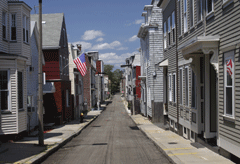- Title Page
- Introduction
- Boston Globe —Brief History
- Baron—A New Face
- An Investigation is Born
- The Spotlight Team
- The National Picture
- The "Most Catholic City"
- Cardinal Law
- The Paper and the Cardinal
- The Globe and Boston's Catholics
- Father Geoghan Case
- Starting to Dig
- Organizing the Files
- The Database Grows
- When the Story Gets Personal
- Reporting Your Culture
- Potential Backlash
- Rezendes Gets a Scoop
- Publish or Pause?
Baron—A New Face
Baron represented a significant change for the Globe . The previous two editors had been Irish-Catholic; Baron was Jewish, the son of Israeli immigrants. Every previous editor in the Globe ’s history had come from the inside; Baron had been executive editor of the Miami Herald and, before that, associate managing editor of the New York Times . He was new not just to the Globe, but to Boston. The city’s reputation for insularity and provincialism was perhaps overblown, but it didn’t come from nowhere. Commenting on the hire, a veteran at the Globe complained about Baron’s ignorance of Boston, suggesting that he “wouldn’t know how to find Boylston Street.” [1]

A street in South Boston.
Courtesy
iStockphoto
While Globe staffers could object to the hiring of an outsider—a “ Times man,” no less—they couldn’t claim that Baron wasn’t qualified. Editor and Publisher magazine had just named him Editor of the Year for his work at the Miami Herald , which had received national attention for its coverage of the 2000 presidential election and a 2001 Pulitzer Prize for its coverage of the case of six-year-old Elian Gonzalez, the subject of a custody battle that drew the involvement of the Cuban and American governments.
A question. At 10:30 a.m. on July 30, 2001, Baron walked into his first meeting as the top editor at the Globe . He had started the job that morning. On his mind, among other things, was a column that had appeared in the Globe the day before. The column, by Eileen McNamara, discussed John Geoghan, a retired Roman Catholic priest alleged to have sexually abused more than 100 boys. One of many civil suits against Geoghan had been brought by 25 people who claimed to have been raped between 1985 and 1993. Cardinal Law—who had assigned Geoghan to the parishes where the alleged crimes had taken place—was a defendant in the suit.
The suit had yet to come to trial, but attorneys had begun to file pre-trial motions. In her column, McNamara mentioned that the documents were under seal. Baron had come from Florida, which had an expansive public records law; as editor of the Herald , he had been quick to sue for access to documents. In the July 30 staff meeting, Baron asked if anyone had considered challenging the confidentiality order in court. In response, there was silence. It was not a revolutionary idea, just one that hadn’t occurred to anyone else. “People here had assumed that because there was a confidentiality order, that there was no way that they would be able to gain access to these files,” Baron says. [2] He had other ideas.
[1] Bill Beuttler, “Global Warming,” Boston Magazine , January 2002.
[2] Author’s interview with Martin Baron in Boston, MA, on April 4, 2008. All further quotes from Baron, unless otherwise attributed, are from this interview.